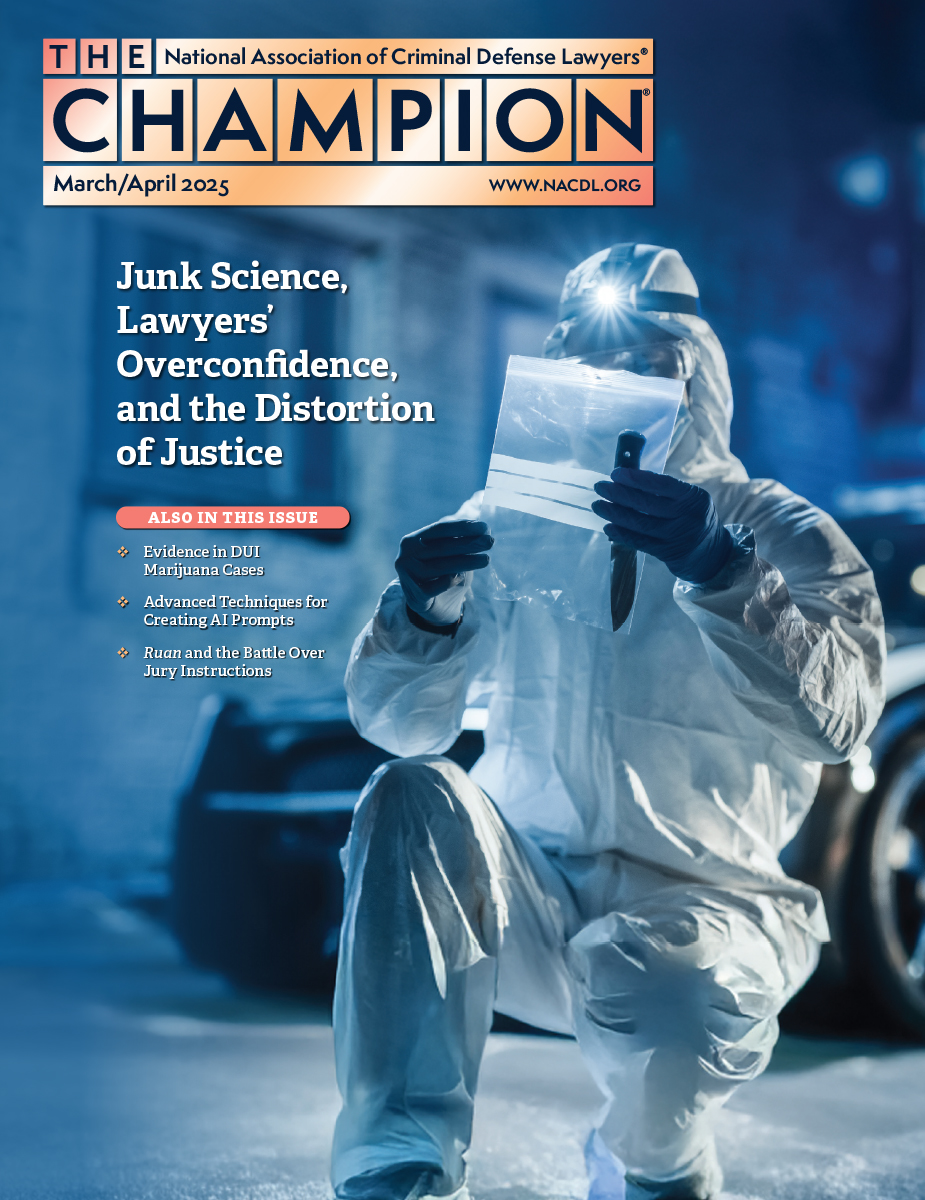March/April 2025

What are the evidentiary implications of field sobriety tests in marijuana cases? Does the odor of marijuana give officers probable cause to search a vehicle?
Articles in this Issue
-
Affiliate News
What events are NACDL affiliates hosting this month? Find out here.
-
Book Review: Surrender by Katherine Ann Power
This month Susan Elizabeth Reese reviews Surrender: My Journey from Guerrilla to Grandmother by Katherine Ann Power.
-
Book Review: V13 by Emmanuel Carrère
This month Russell Stetler reviews V13: Chronicle of a Trial by Emmanuel Carrère.
-
Client Issues & Ethics: The ABA on Confidentiality and Listservs
In May 2024, the American Bar Association issued a formal opinion on the “Confidentiality Obligations of Lawyers Posting to Listservs.” The opinion does not break any new ground, but it applies long-standing principles about the duty of confidentiality in a way that might surprise defense lawyers.
-
Defending Doctors in a Post-Ruan World: The Battle Over Jury Instructions
Did the Ruan case drastically change how the government enforces the Controlled Substances Act? Jurors are no longer instructed to consider physicians’ subjective “good faith” in prescribing controlled substances that are then billed to health care benefit programs. Physicians must pivot and argue for other instructional safeguards to protect themselves against conviction.
-
Digital Age & Practice: Technology — Best Supporting Actor, Not the Star
Technology has a place in courtrooms. However, technology should be considered verbal support, not a verbal substitute.
-
Dunning-Kruger and the Law: Lawyers’ Overconfidence in Their Scientific Abilities
Allows Junk Science to Pervert Justice
Judges and lawyers do not understand the basic principles and methods of science, but they think they do. Is there a way to rectify their deficiencies?
-
Evidence in DUI Marijuana Cases
Defending DUI marijuana cases requires fighting the notion that a positive marijuana blood test, or the admission of recent marijuana use alone, is evidence of impairment. Because no valid test exists, toxicologists cannot testify that a specific amount of tetrahydrocannabinol (THC) in a suspect’s blood is associated with being impaired by marijuana and renders a driver unable to drive safely.
-
From the President: Our Time
Defense lawyers are the only advocates in the legal arena positioned to take a stand against the erosion of the last vestiges of the Fourth, Fifth, and Sixth Amendments.
-
Litigation Unfolds After Pres. Orders BOP to Move Transgender Women Incarcerated in Federal Prisons
On his first day in office, the president signed an Executive Order that directed the Bureau of Prisons to move transgender women housed in female facilities to men's prisons and cease funding any gender-affirming medical care for inmates. Within a week, litigation was underway.
-
Mastering Prompt Engineering: Advanced Techniques in AI-Powered Criminal Defense
Advanced prompt engineering strategies can increase the effectiveness of artificial intelligence. For example, a defense lawyer can employ prompts to create a bulleted list that serves as a reference tool when formulating an argument for presentation before a judge or jury.
-
NACDL News: Victor Sherman and Stanley Greenberg Receive Award at Aspen Seminar
NACDL News for March/April 2025
